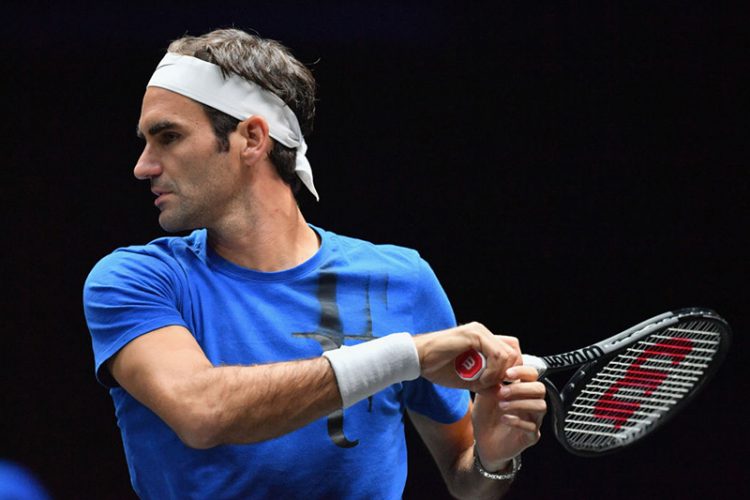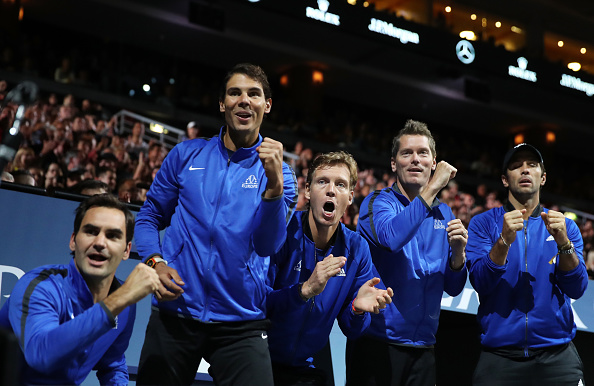
He’s enjoyed one of the greatest comebacks in sports history. Ahead of second day action where he will debut for Team Europe, lavercup.com casts a microscope on Roger Federer’s remarkable Road to Prague.
Many people use the word ‘fairytale’ to sum up Roger Federer’s 2017 season to date.
But for the man many people consider to be the greatest tennis player of all time, there is nothing magical about the Swiss’ extraordinary year. Rather, it’s been hours, days and weeks of plain hard work.
And it’s paid off. At 36-years of age and in his 19th year of pro tennis, Roger Federer has claimed two Grand Slams to extend his all-time major singles titles record to 19. He also has three other ATP titles on the year and has ascended 14 spots in the world rankings to No.2.
The Swiss kick-started his comeback in January the only way he knows how: creativity, class and belief. Down a break in the fifth set of the Australian Open against his storied rival Rafael Nadal, Federer refused to stop taking risks, or playing on instinct, and ultimately triumphed 6-4 3-6 6-1 3-6 6-3.

He has five majors Down Under, one in Paris, eight Wimbledon trophies and five US Open championships that were achieved consecutively from 2004-2008.
As Roger soared up the junior ranks, it was always clear he would be a great; he had generational talent and a healthy ego to harness it. But the Basel native wasn’t always the hardest worker and there were times where he lacked self-control.
“Fighting spirit wasn’t always at its best when I was younger,” Federer acknowledged in 2008.
Those times, of course, were short-lived.
The Swiss spent hours with sports psychologists, endured a tragic personal loss and managed to train himself into the Zen-like competitor that earned a reputation as the second most respected, admired and trusted person in the world (according to research by the reputation institute – Nelson Mandela was No.1)
And in 2003, he put all the pieces of the puzzle together. Roger won his first Grand Slam, Wimbledon, and in the following year achieved his life-long goal to be world No.1 — a mantle he would sit atop of for a record 237 straight weeks. To date he has been ranked No.1 longer than anyone else at 302 weeks.
He won at least two majors five times (a record he has since improved to six), reached the final at all four Grand Slams three times and made 42 and 51 consecutive semifinals and quarterfinals respectively.

In 2005, incredibly, Federer only dropped nine sets in four Grand Slams. In 2006, it was only 13, having lost just two sets combined en route to championships at the Australian Open and Wimbledon. He did not concede a single set at the 2007 Australian Open.
“We are witnessing history. This is the most dominant athlete on planet earth today,” Team World captain John McEnroe remarked in 2012.
Post 2012, Federer suffered knee and back soreness, and eventually fell to No.8 behind just one title and a second-round defeat at Wimbledon to a man ranked outside the top 100.
The years went by, and while Roger kept collecting ATP titles and keeping his name inside the top 5, his body (and, perhaps, Novak Djokovic) wouldn’t allow him to go the extra miles required to capture an all-elusive 17th Grand Slam.
In July 2016 Federer withdrew from the remainder of the season without a title and it finally looked like he was going the way of all the greats before him.
The bloggers filed in with their ‘Ten Reasons Why Roger Federer Will Never Win Another Grand Slam’ pieces; the Federer loyalists were forced to look for a Next Genner to follow and a small part of Djokovic, Andy Murray and Rafael Nadal breathed a sigh of relief.
So, Federer asked his trainers, coaches and family one simple question: is it possible for me to win another Grand Slam?
“Basically the answer was always the same from them,” Federer revealed in July. “[They said] that they thought if you’re 100 per cent healthy and you’re well-prepared, you’re eager to play, then anything’s possible.”
And the rest is history.
After starting the 2017 season at a 16-year rankings low, Federer is now sitting behind just one man–Rafael Nadal–and has two majors, two Masters 1000s, and one ATP 500, He has lost just four matches from a possible 43.
At Wimbledon, after not dropping a single set all tournament, Roger was asked what kind of magical grit and determination is required to win the most prestigious tennis tournament in the world eight times – as he had just done.
“Winning eight is not something you can ever aim for, in my opinion.” He replied.
“I guess I dreamed, I believed, and really hoped that I could actually maybe really do it, you know, to make it real. So I put in a lot of work, and it paid off.”
ROGER’S ROAD TO PRAGUE
JANUARY
Australian Open (outdoor hard): Final defeated to Rafael Nadal 6-4 3-6 6-1 3-6 6-3
FEBRUARY
Dubai Duty Free Championships (outdoor hard): Round of 32 lost to Evgeny Donskoy 3-6 6-7(7) 6-7(5)
MARCH
BNP Paribas Open, Indian Wells (outdoor hard): Final defeated to Stan Wawrinka 6-4 7-5
Miami Open (outdoor hard): Final defeated Rafael Nadal 6-3 6-4
JUNE
Mercedes Cup, Stuttgart (outdoor grass): Round of 16 lost to Tommy Haas 2-6 6-7(8) 4-6
Garry Weber Open, Halle (outdoor grass): Final defeated Alexander Zverev 6-1 6-3
JULY
Wimbledon (outdoor grass): Final defeated Marin Cilic 6-3 6-1 6-4
AUGUST
Couple Rogers, Montreal (outdoor hard): Final lost to Alexander Zverev 3-6 4-6
SEPTEMBER
US Open (outdoor hard): Quarterfinals lost to Juan Martin del Potro 5-7 6-3 6-7(8) 4-6